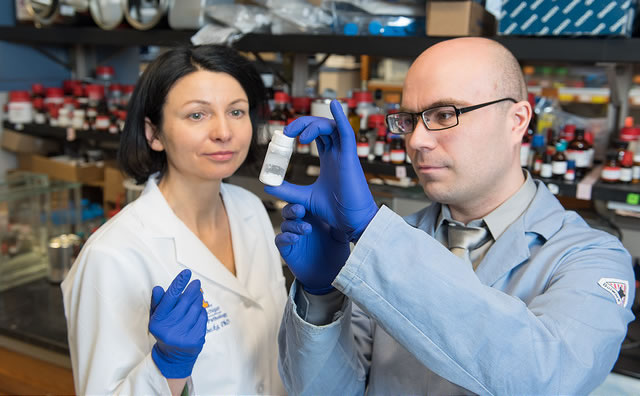Developmental Therapeutics
Developmental Therapeutics Program Promotes the Advancement of Discoveries
The Developmental Therapeutics Program fosters the advancement of University of Michigan Rogel Cancer Center discoveries to translational research. Under the guidance of co-leaders Jolanta Grembecka, Ph.D., and Judith Sebolt-Leopold, Ph.D., the Developmental Therapeutics Program moves basic science discoveries to the preclinical level and aids members in moving their discoveries along the translational pipeline.
Our elite researchers are experts in disease-specific cancers with very specific expertise in certain targets, or gene families. Our members work closely with colleagues in the Basic Science Programs, providing insights, guidance and scientific collaboration with the goal of moving discoveries from the laboratory to the next stage. This process is done through collaboration and coordination with the Translational and Clinical Research Program.
Identifying Pharmaceutical Intervention of Novel Cancer Targets
Developmental Therapeutics Specific Aims
Aim 1: Target Validation
Validate novel cancer targets that are amenable to pharmacologic intervention.
Aim 2: Lead Optimization
Discover, optimize and evaluate promising therapeutic agents and potential biomarkers of response in relevant preclinical model systems.
Aim 3: Drug Candidates
Advance DT drug candidates into clinical trials through structured collaborations with clinical investigator teams.
The academic drug discovery process — selecting the target to design the drug against — uses computational computer-assisted drug design and chemistry to test compounds biologically in various models of cancer. Starting with cell-based testing and moving through animal testing and then to clinical trials, the critical path to discovery always includes safety and toxicology testing. Some key examples of member research in this area include:
- Discovery of the first inhibitors of the ETV/PEA3 transcriptional activators
- Demonstration of scientific rationale for therapeutic targeting of CK1α to block KRAS effector signaling for lung cancer
- Development of anti-breast cancer targeted therapies of rapamycin complex 1 (mTORC1) pathway
- Targeting protein-protein interactions in PRC2 complex in cancer stem cells to develop triple-negative breast cancer therapeutics
- Identification of therapeutic targets for breast cancer
- Identification of potent inhibitors of protein disulfide isomerase (PDI) for potential treatment of glioblastoma
- Identification of small molecule inhibitors of PRC1 to target leukemia stem cells
- Structure-based design of small molecule peptidomimetics to the WDR5-MLL1 protein-protein interactions

Evaluating Promising Therapeutic Agents and Biomarkers
With precision medicine or molecular targeted therapies, the challenges are the same — safety, regression and tumor resistance. We now are able to better determine the biomarkers to know if the drug hit the target or failed. With these advances in biomarker research, we know sooner the most efficient dosage to hit the target hard enough to avoid regression. Examples of member research in this area include:
- Discovery of MTX-211, a highly selective inhibitor of EGFR and PI3K kinase signaling and promising development candidate for the treatment of metastatic colorectal cancer
- Successful targeting of the heat shock protein 90 (HSP90) molecular chaperone complex to enhance drug delivery to adrenal and breast cancer cells
- Demonstration that a mechanism-based therapy prevents recurrence in preclinical models of malignant salivary gland cancer
- Development of menin-MLL inhibitors for targeted therapy in leukemia and solid tumors
- Demonstrated Mcl-1 as a validated therapeutic target for treatment of pancreatic cancer
Advancing Preclinical Proof of Studies into Clinical Trials
One of the measures of success of the Developmental Therapeutics Program is not just the number of compounds developed through proof of studies, but the intellectual property established by many scientists within the division. Examples of advancing preclinical proof of concept studies into biomarker-enabled clinical trials include:
- Discovered and advanced six small-molecule antagonists of key apoptosis regulators into clinical development for cancer treatment
- Development of the Wee1 inhibitor AZD1775 for pancreatic cancer therapy
- Initiation of clinical trials targeting cytokine regulatory pathways in breast cancer stem cells

Targeted and Collaborative Approach in Developmental Therapeutics
Developmental Therapeutics Program research projects encompass a broad spectrum of anticancer drug targets that fall within one of these predominant research themes:
- Protein-protein interactions
- Small molecule kinase inhibitors
- Small molecule epigenetic therapeutics
- Stem cell therapeutics
- Radiation sensitizers
These themes are not mutually exclusive: for example, researchers are looking at kinase inhibitors as radiation sensitizers or therapeutic strategies combining protein-protein antagonists with kinase inhibitors. Consequently, many inter-programmatic as well as intra-programmatic collaborations have been established based on common thematic areas of interest among Rogel Cancer Center members. Examples include:
- The Prostate SPORE includes an epigenetic project focusing on BET bromodomain inhibitors and degraders
- Several National Institutes of Health-funded programs are studying the MLL-WDR5 protein-protein interaction in acute leukemia
The success of these research accomplishments, including compounds developed, patents and new companies formed, continues to have a major impact on cancer-specific patient outcomes.
